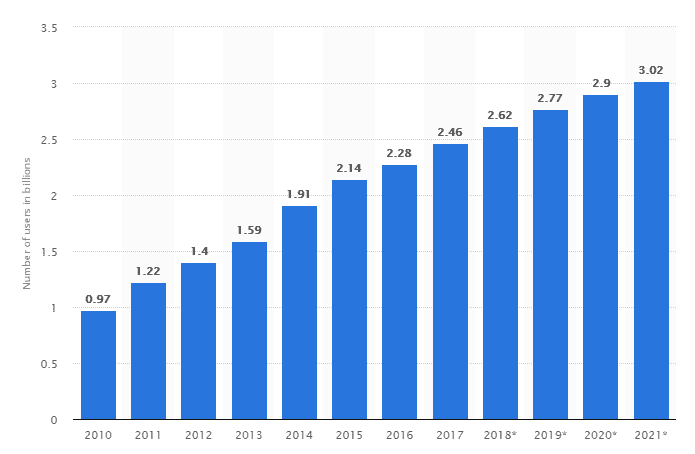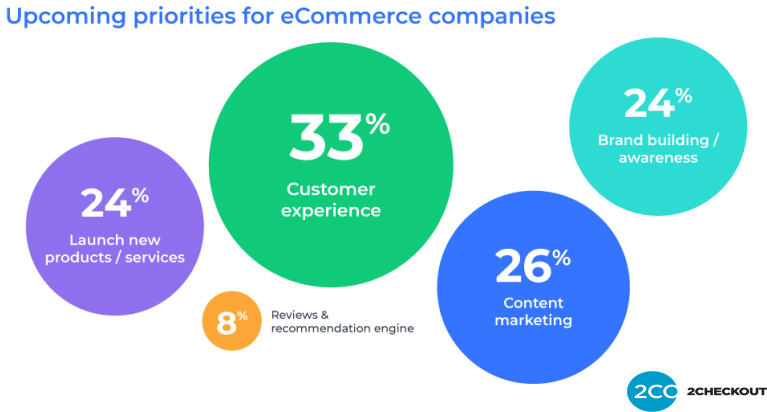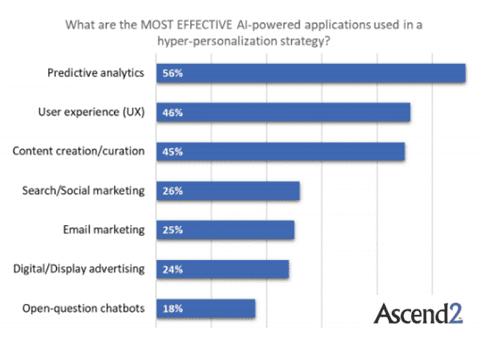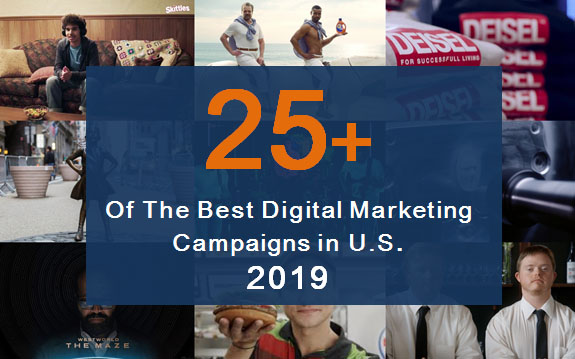How to Win Tomorrow’s Buyers: Artificial Intelligence, the New Era of Marketing
Data-Driven Marketing | May 23, 2019
Almost 20 years ago, Bill Gates first published its book “Business @ the Speed of Thought” that explained how technology and digital infrastructures can put businesses ahead of their competition. However, the book seems outdated as the Internet was in its early stages, but the basic idea of the book still stands- due to evolving technology, business moves fast. And so do the marketing efforts.
Over the years, how we communicate has evolved immensely. Today, new technologies have hit the marketing landscape and many of our inventions are focused on creating faster ways of communication, and in the process, we’re creating more data than humans can comprehend.
Imagine that, there are over 2.7 billion active social media users in 2019. Among them, there are your customers and potential customer. The question now is, how can you reach them in today’s fast-paced digital landscape?
Artificial Intelligence (AI) is the new trend that emerging at the nexus of all this.

Number of Social Media Users Worldwide From 2010 to 2021 (in Billions)
But while we often talk about using or incorporating Artificial Intelligence in marketing, what do we really mean by that? and what does it look like in practice?
What is Artificial Intelligence Marketing?
Artificial Intelligence is the ability of a machine to perform the cognitive functions associated with human minds, such as learning, perceiving, reasoning, problem-solving, interacting with the environment, and exercising creativity. Examples of technologies that enable AI are machine learning, robotics, autonomous vehicles, virtual agents, and computer vision.
Artificial intelligence Marketing (AI Marketing) is a method of leveraging customer data to improve the customer/buyer journey, create more effective marketing and social media strategies, capture and nurture leads. Whether someone is searching for an item to buy, communicating with a buyer or seller, or listing a product to sell, AI is behind the scenes making the experience much better.
How Artificial Intelligence Marketing Is Changing Customer Experience
In the last few years, organizations have been struggling to build superior customer experiences and powerful engagement into their marketing efforts. An Adobe study indicated that optimizing customer experience the most exciting opportunity for the year ahead.
Adobe’s study also revealed that North American and European companies are putting most emphasis on making the experience as valuable as possible, while APAC companies are most likely to focus on making the experience as personalized and relevant as possible.
Another study conducted in 2019 showed that offering a great customer experience is the key e-commerce priority for 33% of companies. 98% of marketers indicated that personalization helps advance customer relationships, with almost three-quarters of them claimed it has a “strong” or “extreme” impact, According to Evergage.

The Top Marketing Priorities for E-Commerce Companies Worldwide in 2019
Customers are drawn towards good experiences that make them loyal to organizations. Hence, it becomes critical for organizations to understand what and create unique and positive experiences for customers. The prime potency of Artificial Intelligence lies in its ability to collect huge amounts of data at a very high speed, recognize patterns, learn from them and enable better decision-making.
The 2018 IAB Europe’s report emphasizes that artificial intelligence allows marketers to provide more time to make strategic decisions and provides better access to relevant data to make decisions.
In this context, when AI is effectively applied to understand buyer behavior, it can lead to more accurate predictions and decisions. It can further enable organizations and marketers to reach out to their customers at a personal level, engage in deeper interactions and improve their overall experience with the brand.
AI can also be used extensively to offer real-time, hyper-personalized recommendations to customers. According to a study conducted by Ascend2, predictive analytics and User experience (UX) are the most effective AI-powered application used in hyper-personalization strategies in 2018.

The Most Effective AI-Powered Application Used in Hyper-Personalization Strategies in 2018
How Marketers Leverage the Core Elements of AI for Marketing
There are a few key elements that make AI marketing as powerful as it is today, including big data, machine learning, and the right solutions. AI marketing is gaining more attention among marketers thanks to the insights it provides. A PwC study showed that 72% view AI as the “business advantage of the future”.
The State of Marketing report of Salesforce states that more than in 2019 just 29% of marketing leaders worldwide are already using AI, with 46% either testing or planning to use AI within the next two years. Marketers’ adoption of AI has grown by a rate of 44% since 2017.
Here are some ways that marketers can expect AI to influence marketing outcomes:
- Smarter Ads: With a new wealth of big data available, online ads can grow smarter and be more effective. AI solutions can dig deeper into social profiles, keyword searches, and other online data for human-level outcomes.
- More Intelligent Searches: AI, big data, and machine learning solutions can actually analyze the different search patterns of online users and help marketers identify key areas where they should focus their efforts.
- Relying on Bots: Retention and customer service is another area where AI will play an essential role in the future. Many businesses can save expenditures and employees’ time with AI bots that have access to an entire internet’s worth of data, information, and search histories, making them much more efficient.
- Refined Content Delivery: With the adoption of AI, marketers can take data and target to a whole new level. They can use AI to identify potential buyers or clients and deliver the ideal content that’s most relevant to them. With big data, AI and machine learning combined, there is little a savvy marketer can’t achieve.
- Continued Learning: Over time, AI solutions will grow to be even more intelligent, greatly increasing conversions, effectively eliminating waste, and promoting real-time decision-making.
Conclusion
Artificial Intelligence Marketing (AI Marketing) is the next big thing in the world. Businesses must make sure that they use AI intelligently to offer personalized experiences. But remember that the moment AI enters their privacy zone, it can result in a negative experience. So, it is important to strike the right balance.
It worth to be mentioned that, application of AI in marketing requires not just money but also patience, meticulousness, and other human skills that too often are in short supply. Lastly, don’t be afraid of AI, but embrace it.





